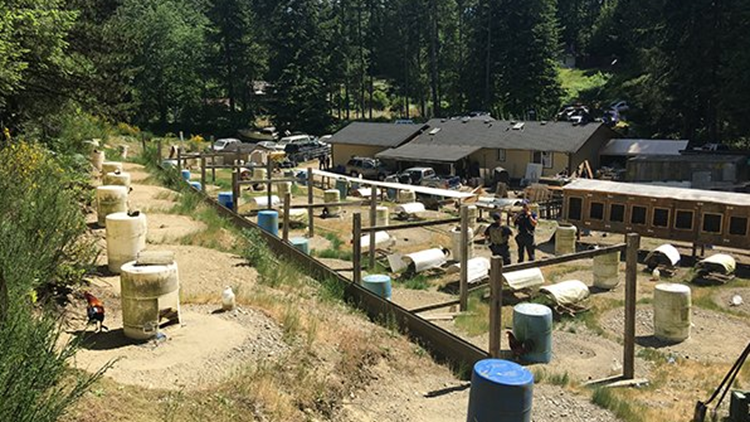Charges against two men accused in June of running a Port Orchard cockfighting ring were dismissed because authorities allegedly ran afoul of state law when outfitting an informant with a concealed wire and camera.
It is common in movies and TV to see police surreptitiously plant electronic devices on informants to record suspects committing crimes or making incriminating statements.
However, attorneys for Kenneth Castro San Nicolas, 55, and Joe Leon Guerrero Salas, 67, wrote in court documents that strict privacy laws have to be followed to allow the evidence to be used in court, and were not. The two had been facing multiple felony charges of first-degree professional gambling and animal fighting.
“Law enforcement must now live with the consequences of that erroneous decision,” attorneys Jeremy Morris and Jeniece LaCross wrote in their requests to suppress the evidence.
According to authorities, Salas refereed the fights and San Nicolas owned the house on SE Edmonds Street where the alleged fights took place.
Tossing the case abruptly ended a lengthy investigation by state Gambling Commission investigators, who prepared the applications to allow the surveillance, met with the informant and four times provided him $3,800 total to gamble on bird fights, one in Auburn and three in Port Orchard, according to court documents.
Arrests announced in June
When San Nicolas and Salas were arrested during a suspected fight at the Edmonds Street property, 27 people were detained and 300 chickens were seized. The commission received about $24,000 that was seized from 17 people in attendance.
“Cockfighting is a brutal blood sport that is almost always operated solely for the purpose of conducting illegal gambling,” Commission Director Dave Trujillo said in a statement. “With assistance from our law enforcement partners, we were able to take the ringleaders into custody and save these birds from a cruel and violent death.”
Citing the aggression of fighting birds, and claims that they had been given steroids and vitamin injections, the roosters could not be rehabilitated or eaten by people. They were euthanized at the scene, according to the statement. Hens and chicks found at the property were going to be “rehoused.”
Charges dismissed four months later
On Sept. 28, prosecutors dismissed all charges against San Nicolas and Salas, citing an “insurmountable search and seizure issue.”
Deputy Prosecutor Lael K. Carlson, who had been assigned the case after the arrests, said the resolution was disappointing.
“I know the Gambling Commission spent a lot of time and energy, and cared about this case,” she said. “Obviously it’s not something we took lightly, but we didn’t see any alternative.”
Carlson said it was possible charges could be filed again, but the evidence would have to be gathered from another investigation.
“If the Gambling Commission investigated again, and got new information, then we could file,” she said. “I don’t know if they are likely to do that.”
As a result of the errors in the case, Carlson said senior deputy prosecutors would now review applications for electronic surveillance to make sure they conform with state privacy laws.
Though the defense attorneys raised other questions about the warrant authorizing the surveillance, the primary problem was commission investigators did not specify where the surveillance was going to take place. The application stated only that it would take place “at a location as of yet undecided, but within King, Pierce and Kitsap” counties.
“That was the biggest issue,” Carlson said of the reasons to back out of the case.
The defense attorneys noted that state law allows officers investigating some drug cases to be vague about where surreptitious recording will take place, but only drug cases. For all other cases for which officers want to use wires, investigators must specify in their application to a judge where exactly they intend to conduct the surveillance.
“This is, unquestionably, a demanding and exacting requirement — but it is the law for all crimes other than major drug crimes,” the attorneys wrote.
LaCross wrote in a statement to the Kitsap Sun that Washington state highly values a person’s right to privacy.
“We have specific and high standards that must be complied with before a government official can intrude upon our privacy,” LaCross wrote. “Here, the government failed. The violation of an individual’s privacy is not to be tolerated.”
Attorneys explain alternatives
As part of their request to suppress the recordings, defense attorneys explained ways officers could have gone about the investigation without violating the state Privacy Act, one of the country's most strict privacy laws.
One way was following the “common sense” course of getting a search warrant, going to the property and seizing “all sorts of physical evidence, including the birds themselves.”
If investigators still wanted to send in an informant wired with recording devices, the attorneys wrote investigators “could have easily remedied this problem” by leaving the location blank on the application and waiting for the informant to arrive at the property. The informant had a tracking application on his phone, and investigators could have used that data showing that he was at the Port Orchard residence and then filled in the blank spot before handing it to a judge for review.
“Based on my experience, wire orders are rare outside of drug cases and that is probably because the requirements are so high,” Morris told the Kitsap Sun.
Heather Songer, a spokeswoman for the commission, said investigators don’t use these methods very often and as a result of the dismissal the commission is adding additional training for investigators and more supervision when applying for surveillance warrants.
“Obviously as a result of these charges being dismissed we are definitely reviewing our processes,” Songer said.
Investigation uncovers subculture
The investigation started in 2013 after law enforcement began looking into a Thurston County operation and alleged participants knew they were being scrutinized. In February 2015, a commission investigator followed San Nicolas from the Edmonds Street residence until San Nicolas pulled into a busy parking lot, rolled down his window and shouted at her: “Stop (expletive) following me.”
Momentum started to build in early 2018 when a man familiar with cockfighting community agreed to work as an informant.
Although the commission investigator did not explain in her application the informant’s motivation or how he was known to be reliable — another point the defense attorneys made about the shortcomings of the investigation — he apparently knew a lot about cockfighting.
He participated in the all-day gatherings, helping to outfit birds with the sharp blades, or gaffs, telling investigators he only attached the gaffs to the birds’ left leg and that the birds were injected with vitamin B-12 the day before fights, not the day of.
The subculture drew interest from an international group of gamblers who kept their hobby secret by holding “invite only” weekend gatherings, the informant told investigators. “Derbies” can attract up to 60 people where several, if not dozens, of fights are staged and one person's wagers can go as high as $2,000 on one bout.
Food and drinks are sometimes provided, winners pay a fee and dead birds can be incinerated in a fire, also for a fee. Smoke from the fire was visible to investigators.
“He said it is a very tightly knit community and if you are unknown to the group, you are not allowed into the fight,” an investigator wrote. “He said typically they leave cars behind and whoever is bringing birds to the fight can bring a vehicle. All other spectators have to fit into the car with the individual bringing the birds.”
Using money provided by commission investigators, the informant bet on 24 fights during four days, winning about $1,200 and losing $2,240, according to court documents.
Although in some countries and cultures, cockfighting is accepted if not legal, but participants knew it was illegal in the U.S., according to court documents, and organizers rotated fights between locations in Snohomish, King and Kitsap counties to avoid law enforcement.
“He said there was a fight out in (the) Bremerton/Port Orchard area a few years ago but it was cancelled because they thought law enforcement was watching or onto them,” an investigator wrote.
Songer, from the commission, said at the very least investigators believe they disrupted a cockfighting ring.
“We achieved our mission in that sense,” she said. “Hopefully this deterred others from joining in on these types of activities.”



